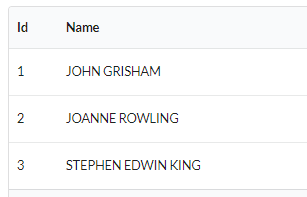Transformers¶
Note
The Transformers module uses the static class TransformersManager to manage data transformations.
Transformers are used to transform datas after loading from the database, or before displaying in a view.
Adding transformers¶
Either the Author class that we want to use in our application :
1 2 3 4 5 6 7 8 9 10 11 12 13 14 15 16 17 | namespace models;
use Ubiquity\attributes\items\Transformer;
class Author {
#[Transformer('upper')]
private $name;
public function getName(){
return $this->name;
}
public function setName($name){
$this->name=$name;
}
}
|
1 2 3 4 5 6 7 8 9 10 11 12 13 14 15 16 17 | namespace models;
class Author {
/**
* @var string
* @transformer("upper")
*/
private $name;
public function getName(){
return $this->name;
}
public function setName($name){
$this->name=$name;
}
}
|
We added a transformer on the name member with the @transformer annotation, in order to capitalize the name in the views.
Generating cache¶
Run this command in console mode to create the cache data of the Author class :
Ubiquity init-cache -t=models
transformer cache is generated with model metadatas in app/cache/models/Author.cache.php.
Transformers informations can be displayed with devtools :
Ubiquity info:model -m=Author -f=#transformers

Using transformers¶
Start the TransformersManager in the file app/config/services.php:
\Ubiquity\contents\transformation\TransformersManager::startProd();
You can test the result in the administration interface:

or by creating a controller:
1 2 3 4 5 6 7 8 9 10 11 | namespace controllers;
class Authors {
public function index(){
DAO::transformersOp='toView';
$authors=DAO::getAll(Author::class);
$this->loadDefaultView(['authors'=>$authors]);
}
}
|
<ul>
{% for author in authors %}
<li>{{ author.name }}</li>
{% endfor %}
</ul>
Transformer types¶
transform¶
The transform type is based on the TransformerInterface interface. It is used when the transformed data must be converted into an object.
The DateTime transformer is a good example of such a transformer:
- When loading the data, the Transformer converts the date from the database into an instance of php DateTime.
- Its reverse method performs the reverse operation (php date to database compatible date).
toView¶
The toView type is based on the TransformerViewInterface interface. It is used when the transformed data must be displayed in a view.
toForm¶
The toForm type is based on the TransformerFormInterface interface. It is used when the transformed data must be used in a form.
Transformers usage¶
Transform on data loading¶
If ommited, default transformerOp is transform
$authors=DAO::getAll(Author::class);
Set transformerOp to toView
DAO::transformersOp='toView';
$authors=DAO::getAll(Author::class);
Transform after loading¶
Return the transformed member value:
TransformersManager::transform($author, 'name','toView');
Return a transformed value:
TransformersManager::applyTransformer($author, 'name','john doe','toView');
Transform an instance by applying all defined transformers:
TransformersManager::transformInstance($author,'toView');
Existing transformers¶
| Transformer | Type(s) | Description |
| datetime | transform, toView, toForm | Transform a database datetime to a php DateTime object |
| upper | toView | Make the member value uppercase |
| lower | toView | Make the member value lowercase |
| firstUpper | toView | Make the member value first character uppercase |
| password | toView | Mask the member characters |
| md5 | toView | Hash the value with md5 |
Create your own¶
Creation¶
Create a transformer to display a user name as a local email address:
1 2 3 4 5 6 7 8 9 10 11 12 | namespace transformers;
use Ubiquity\contents\transformation\TransformerViewInterface;
class ToLocalEmail implements TransformerViewInterface{
public static function toView($value) {
if($value!=null) {
return sprintf('%s@mydomain.local',strtolower($value));
}
}
}
|
Registration¶
Register the transformer by executing the following script:
TransformersManager::registerClassAndSave('localEmail',\transformers\ToLocalEmail::class);
Usage¶
1 2 3 4 5 6 7 8 9 10 11 12 13 14 15 16 17 | namespace models;
use Ubiquity\attributes\items\Transformer;
class User {
#[Transformer('localEmail')]
private $name;
public function getName(){
return $this->name;
}
public function setName($name){
$this->name=$name;
}
}
|
1 2 3 4 5 6 7 8 9 10 11 12 13 14 15 16 17 | namespace models;
class User {
/**
* @var string
* @transformer("localEmail")
*/
private $name;
public function getName(){
return $this->name;
}
public function setName($name){
$this->name=$name;
}
}
|
DAO::transformersOp='toView';
$user=DAO::getOne(User::class,"name='Smith'");
echo $user->getName();
Smith user name will be displayed as smith@mydomain.local.